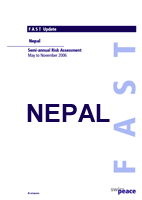|
FAST
Update Nepal: Semi-Annual Risk Assessment May - Nov 2006
|
 |
Risk
Assessment:
The
successful peoples' movement demonstrations of April 2006 resulted in the
graph lines crossing as Country Stability rose and Confrontational Events
declined. Though the Confrontational Events curve shows some instability
thereafter, the basic underlying improvement is maintained and this is
reflected in the continued strong optimistic Country Stability index. The
optimistic graph lines are even stronger towards October and further enhanced
by the signing of the peace agreements between the Government of Nepal
and the Communist Party of Nepal ? Maoist (CPN-M, or Maoists) during November.
The
road to the November agreements was shaky. The euphoria at the end of April
gave way to a more realistic appreciation of the difficulties of the task
ahead and there were times when confidence ebbed. Worries that the government
might not deliver on agreements made with the Maoists in order to progress
the peace process rose during May. There were also fears, which have not
been totally allayed, that the monarchy and or the army may reassert itself.
During
May, the House of Representatives stripped the King of many of his powers
and asserted Parliamentary control over the army
On
June 2 the Maoists held a huge mass meeting in Kathmandu which 200,000
people were reported to have attended. This display of support stunned
many observers
During
the April to November period, many Nepalis were apprehensive that international
intervention, particularly from India or the US, was going to undermine
the talks and plunge the country back to war. The Indian agreement to UN
management of weapons, announced on June 9 gave some reassurance. Nevertheless,
strong anti-Maoist statements by the US ambassador continued to cause concern.
The
historic agreements reached between the government of Nepal and CPN-M should
bolster Country Stability and end the risk of armed confrontation between
these conflict parties.
top
Source:Reliefweb
2006
|
Links
|
 |
top
top

|



